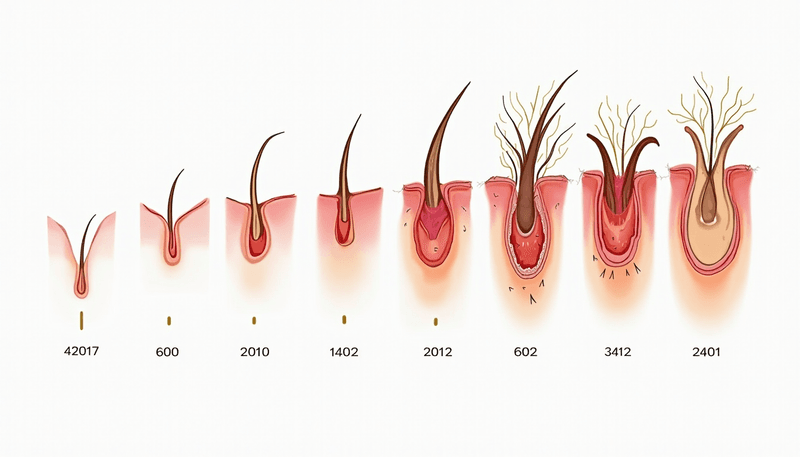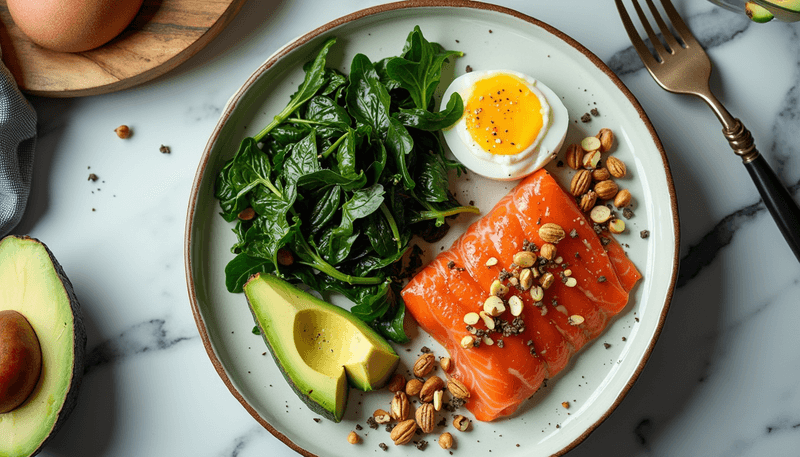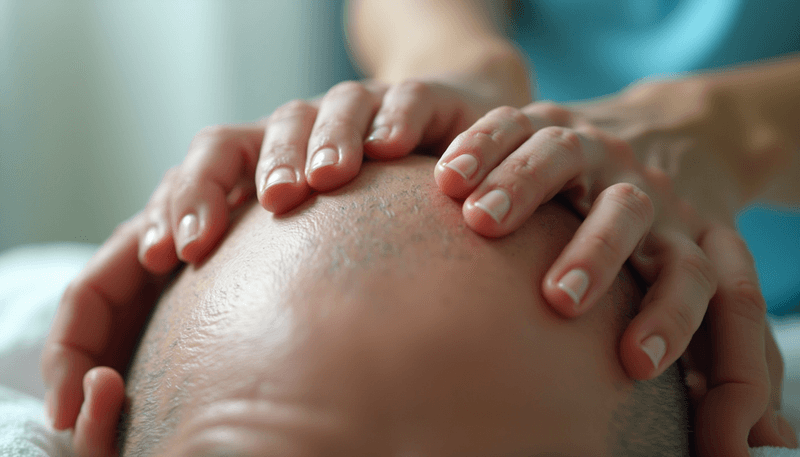Hair Loss During Menopause: Your Action Guide

Standing in front of the mirror, noticing more hair in your brush than usual can trigger a wave of anxiety. If you're approaching or experiencing menopause, you're not alone in this concern - about half of women experience hair thinning during this natural transition. Let's explore what's really happening and, more importantly, what you can do about it.
The Hormone Dance: Understanding Why Hair Loss Happens
Think of your hormones like an intricate orchestra. During menopause, the main conductors - estrogen and progesterone - start to step back, allowing testosterone (yes, women have it too!) to play a more prominent role. This shift can cause your hair follicles to shrink, leading to thinner hair strands and increased shedding.
Have you noticed changes in your hair texture before other menopause symptoms appeared?
The pattern typically shows up as overall thinning, particularly noticeable along your part line and temples. While this might sound alarming, understanding the process helps us take informed action. The good news? This isn't like male pattern baldness - you're unlikely to develop bald patches, and there are several ways to support your hair health during this transition.
Your Kitchen Cabinet: A Hair Growth Pharmacy
What you eat directly impacts your hair's health. Think of your hair follicles as tiny factories - they need the right raw materials to produce strong, healthy hair. Here's your science-backed shopping list:
- Protein-rich foods: Your hair is made primarily of protein. Include eggs, lean meats, fish, and legumes in your daily meals
- Omega-3 sources: Salmon, walnuts, and chia seeds help maintain scalp health
- Iron-rich foods: Dark leafy greens, lentils, and lean red meat support oxygen delivery to hair follicles
- B-vitamin powerhouses: Whole grains, avocados, and nuts nourish hair from within
"The food on your plate today becomes your hair tomorrow. What one small change could you make to your diet this week?"
Biotin, while often promoted as a hair growth miracle, only helps if you're deficient. Before spending money on supplements, consult your healthcare provider for testing.
The Science of Scalp Care: Beyond Basic Washing
Your scalp is like the soil in a garden - its health directly affects what grows from it. Recent research shows that scalp circulation and inflammation play crucial roles in hair growth during menopause.
What actually works:
- Scalp massage: 4-5 minutes daily increases blood flow to follicles
- LED light therapy: Scientific studies show promising results for regrowth
- Topical serums: Look for ingredients like peptides and adaptogens
- Professional treatments: Platelet-rich plasma (PRP) therapy shows significant results in clinical studies
What doesn't work? Expensive "miracle" shampoos. Save your money - shampoo simply doesn't stay on your scalp long enough to affect hair growth.
The Time Factor: Why Early Action Matters
Here's something I wish every woman knew: hair follicles can become dormant if left untreated for too long. Think of them like hibernating bears - wake them up too late, and they might not respond. The optimal window for intervention starts about two years before menopause (around age 48 for most women).
Early warning signs to watch for:
- Increased shedding during brushing
- Visible scalp through hair, especially at the crown
- Changes in hair texture or thickness
- Slower growth rate
When did you first notice changes in your hair? Starting treatment early can make a significant difference in outcomes.
Your Action Plan Starts Now
Whether you're in perimenopause, menopause, or planning ahead, here's your strategic approach:
- Start with documentation: Take clear photos of your hairline and crown monthly
- Schedule a professional evaluation: Work with a dermatologist or trichologist for personalized treatment
- Review your hair care routine: Minimize heat styling and tight hairstyles
- Implement dietary changes: Focus on protein, iron, and healthy fats
- Consider proven treatments: Discuss options like PRP or LED therapy with your healthcare provider
This journey through menopause is unique for each woman, but you don't have to navigate it alone. Take one small step today - perhaps scheduling that evaluation or adding more protein to your diet. Your future self will thank you for taking action now.
What one action from this guide will you implement this week to support your hair health?

Amelia Grace Okonkwo
Amelia Grace Okonkwo is a freelance health writer and author with over 15 years of experience in health journalism, specializing in women's health and autoimmune disorders. With a background in biology and a Master’s in Public Health from Johns Hopkins, she combines scientific accuracy with a storytelling approach to make health information accessible and empowering. Amelia is known for her bestselling book, "The Skin We're In," which explores autoimmune disorders and their impact. She is passionate about delivering practical health insights for women, addressing topics from midlife wellness to mental health.







